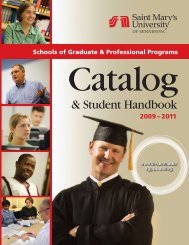PDF version - Saint Mary's University of Minnesota
PDF version - Saint Mary's University of Minnesota
PDF version - Saint Mary's University of Minnesota
You also want an ePaper? Increase the reach of your titles
YUMPU automatically turns print PDFs into web optimized ePapers that Google loves.
Physics<br />
P155 Foundations <strong>of</strong> Physics 3 credits<br />
This course is intended for elementary education majors as well as other non-science majors. It<br />
examines the conceptual frameworks that underlie physics, including mechanics, heat, electricity and<br />
magnetism, and light. Two hours <strong>of</strong> lecture and one two-hour lab per week. Offered every spring and in<br />
alternate fall semesters. Prerequisite: mathematics competency.<br />
P180 College Physics 3 credits<br />
This course is a survey <strong>of</strong> fundamental topics in physics, using the mathematical tools <strong>of</strong> algebra,<br />
geometry, and trigonometry. This survey includes kinematics, vectors, Newton's laws, momentum,<br />
energy, oscillations and waves, and thermodynamics. Credit will not be granted for this course and P201.<br />
Prerequisites: high school algebra, geometry, and trigonometry. Co-requisite: P181.<br />
P181 College Physics Laboratory 1 credit<br />
This one three-hour laboratory is held each week to address topics covered in P180 lecture. Credit will<br />
not be granted for this course and P202. Co-requisite: P180.<br />
P201 Introductory Physics I 3 credits<br />
This course is the first half <strong>of</strong> a two-semester introductory, calculus-based, physics course for all students<br />
planning to enter one <strong>of</strong> the scientific pr<strong>of</strong>essions. It covers the fundamental principles <strong>of</strong> mechanics,<br />
oscillations, and fluid mechanics. Offered fall semester. Prerequisites: M149 or M151 (M151 may be<br />
concurrent) and concurrent with P202.<br />
P202 Introductory Physics I Laboratory 1 credit<br />
One three-hour laboratory is held each week covering topics studied in the lectures. Offered fall<br />
semester. Concurrent with P201.<br />
P211 Introductory Physics II 3 credits<br />
This course is the second half <strong>of</strong> a two-semester introductory, calculus-based, physics course for all<br />
students planning to enter one <strong>of</strong> the scientific pr<strong>of</strong>essions. It covers the fundamental principles <strong>of</strong><br />
waves, physical and geometrical optics, and electricity and magnetism. Offered spring semester.<br />
Prerequisites: P201/202; concurrent with P212.<br />
P212 Introductory Physics II Laboratory 1 credit<br />
One three-hour laboratory is held each week covering topics studied in the lectures. Offered spring<br />
semester. Concurrent with P211.<br />
P250 Introduction to Radiation Physics 3 credits<br />
The course includes the study <strong>of</strong> radioactive decay (the interactions <strong>of</strong> ionizing radiation with matter),<br />
characteristics <strong>of</strong> alpha, beta, and gamma radiation, nuclear instrumentation, dose calculations and<br />
dosimetry, production and use <strong>of</strong> x-rays, nuclear statistics, and radiation safety. Offered in alternate<br />
spring semesters. Prerequisites: P211/212 (may be concurrent).<br />
P304 Introduction to Modern Physics with Laboratory 4 credits<br />
This course considers atomic and nuclear physics and studies the experimental evidence that led to<br />
the development <strong>of</strong> the theories <strong>of</strong> quantum mechanics. The special theory <strong>of</strong> relativity, wave particle<br />
duality, and atomic structure are also examined. Students meet for three lectures and one three-hour<br />
lab per week. Offered in alternate fall semesters. Prerequisites: M152 and P211/212.<br />
P314 Digital Systems with Laboratory 4 credits<br />
This is a course on digital electronics and its applications in modern electronic instrumentation.<br />
Emphasis is placed on gaining experience with the use <strong>of</strong> individual digital integrated circuits and<br />
programmable arrays. The course covers Boolean algebra, simple gates, combinational and sequential<br />
logic circuits, counters, shift registers, state machines, astable multivibrators, encoding, decoding,<br />
171 171
















